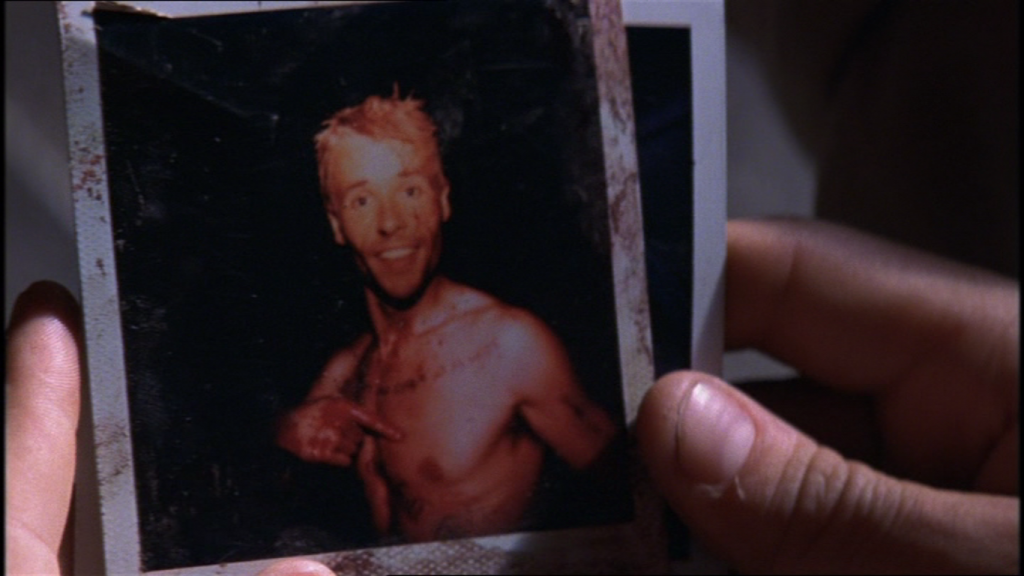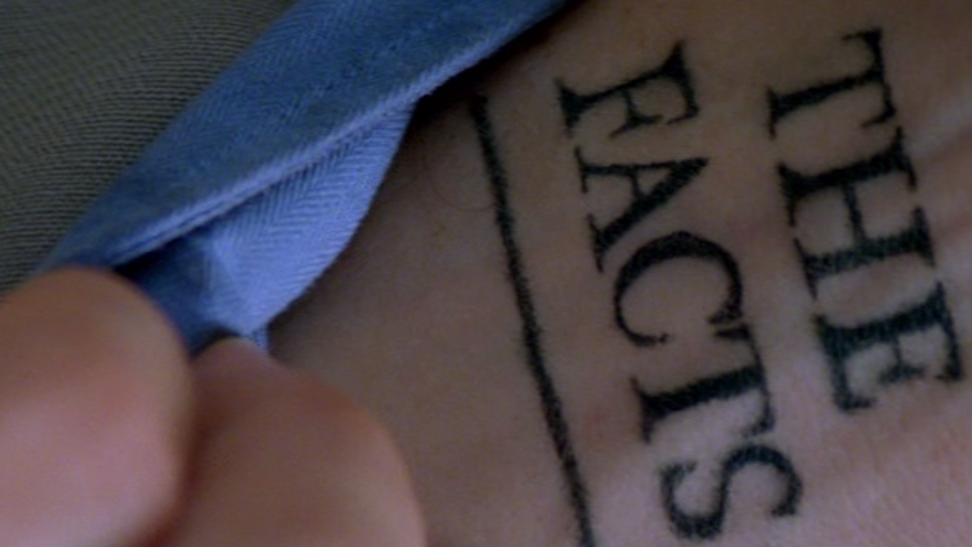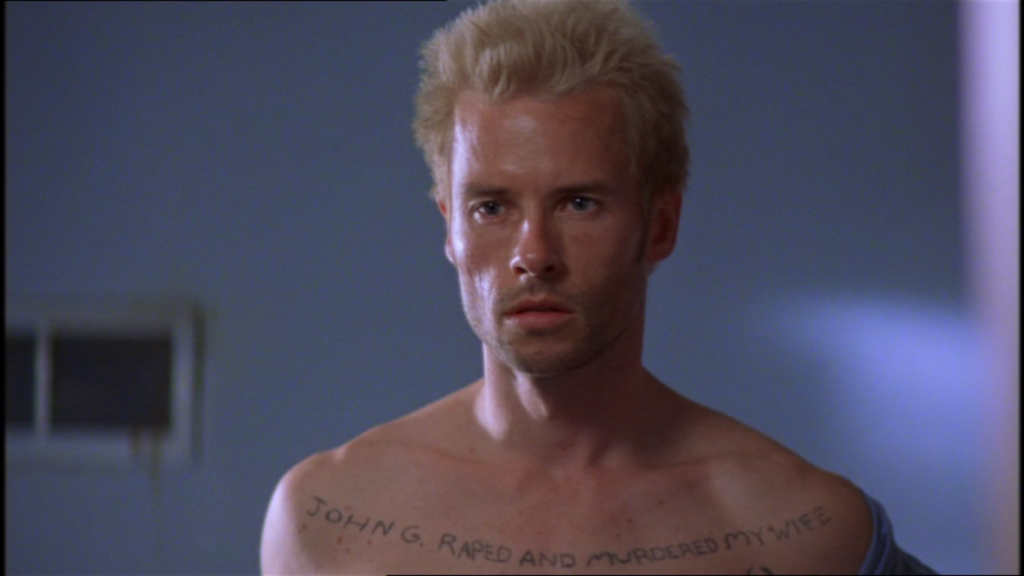
I embedded some thoughts on my master thesis (film & visual culture) in my portfolio for the RMA course ‘Materiality and Corporality of Lived Religion’. My master thesis can be found here, and this post serves to share my reflections on the relation between vision (the eye) and knowledge (the mind).
Beyond the eye=mind equation
rethinking a master thesis on Christopher
Nolan’s Memento
The literature on ‘Religion and the Body’ made me rethink (parts of) the master thesis that I wrote and finished at the University of Antwerp in 2017/2018. Focusing on the ‘sight=knowledge’-bias, issued in the introduction chapter of Philipp Mellor and Chris Shilling (1997), I concisely reassess some of the central conceptions of the thesis through the lens of course-related discourses on materiality and the human body.
My thesis is situated first and foremost in film studies. More particularly, I engage with Christopher Nolans 2000 film Memento through philosophical reflections on the roles of memory, language and desire in the protagonist’s negotiation of his own identity. I use the discursive notion of filmosophy (Frampton, 2006) [philosophy through film, or, better, film as philosophy] to argue that Memento is[1] practicing philosophy by means of its style and its script.[2] The film exposes the protagonist, who suffers from anterograde amnesia, as a subject of desire[3] where we are initially held to believe [through the film’s script and formal structure] that we are witnessing the actions and sharing the thoughts of a subject of knowledge.[4]
Neither religious studies [as a field of study] nor the material turn within the humanities features explicitly in the thesis, and yet I conceive of some conceptions in Mellor (and also, to a lesser extent, in Vasquez) as flawless extensions or additions to the discourses and reflections that I have been working with. I keep in mind that the reader may be not be familiar with the film [and most certainly not with the thesis]; therefore, I intend to focus on my reconsiderations rather than on the thesis itself [in its original format; https://timbouwhuis.nl/masterscriptie-film-als-filosofie-de-werking-van-subject-en-geheugen-in-christopher-nolans-memento/]
In their introductory chapter, Mellor and Shilling write that Westerners, predominantly from the twentieth century onwards, have often prioritized and privileged visual sense as a trustworthy indicator of knowledge.[5] In this context, other sense-related practices (smell, touching, hearing) are downplayed while seeing is triumphed as the base of Enlightenment and empirical research.[6] Sight became a ‘highway’ for the transport of knowledge to the human mind. Thus, sight and thought were continuously conflated.[7]
It is precisely this eye=mind equation that functions as a last resort for our protagonist in Memento. Leonard Shelby (played by Guy Pearce) has a clear motivation that steers his supposedly rational enterprise: he wants to hunt down the person who murdered his wife and subsequently attacked him, causing his amnesia with a hit on the head. Since his mind dysfunctions and his line of ‘thought’ is an endless stream of fade-outs, Shelby trusts completely on his sight, and more particularly, on visual clues, to play his own detective and to ‘follow the facts’ [image 1].

Image 1: ‘’Facts, not memories. That’s how you investigate.’’ Quote from the screenplay, red.
Shelby’s body is crucial to his enterprise. In the absence of a mental instrument to store his memories, all clues are mediated through tattoos [image 2] and polaroid pictures [image 3]. Since Shelby uses his own body to map his quest, that same body literally becomes a presumed locus of knowledge. One of the main efforts of the film is to undermine Shelby’s idealization of his own ‘rational’ enterprise: the misconception that the sum of all visual clues will automatically lead to the truth ultimately unmasks itself. His bias to ‘forget’ [which is an ironical noun in relation to Memento] that sight is on itself a sense[8] neatly fits the Western tendency, in the words of Mellor and Shilling, to equate the eye and the mind. Looking back, it is no coincidence that David Hume’s critique on the pronounced certainties of Cartesianism[9] already took central stage in my thesis analysis.

Image 2

Image 3
In my thesis, I mainly focused on the difference between [rational] knowledge and [emotional] desire, and the way in which Shelby deceived himself by leaning on the illusion of a strict boundary separating the two. Having read Mellor and Shilling [as well as Vazquez’ chapters on the biases of the mind-body dichotomy], I would add [with hindsight] that the radical materialization of Shelby’s ‘knowledge’ indicates a similar critique on the idea that sight is merely a stakeholder for the mind. Indeed, the main source of deception is the visual sense of the protagonist, which gives him the impression that the facts are there because he can see them.
While I am absolutely aware that this entry cannot do justice to the analytical depth that this case actually requires, I am content that the literature for this course week actually challenged me to re-read and revisit some of my own arguments.
Being in the world means confronting the fragility of our minds and bodies.
Bibliography
Mellor,
P.A., and C. Shilling. ‘’Introduction’’. In Re-forming
the Body. Religion, Community and Modernity. London: SAGE, 1997. 1-33.
Notes
[1] In the thesis I elaborate on my theoretical choice to refrain myself from overemphasizing the position/function/influence of the film’s director. Therefore, I use an ontological ‘is’ to suggest, in this context, the film’s own agency as a producer of discourse.
[2] The abstract of my thesis reads as follows: In this thesis I intend to demonstrate that Christopher Nolans Memento (2000) can be read as a filmosophy (film as philosophy – following the academical efforts of Daniel Frampton, Paisley Livingston and Aaron Smuts) on the functioning of memory and the theoretically framed subject positions of the film’s protagonist and the implied spectator. I argue that these two agents reside on a similar level of knowledge by means of the film text (i.e. screenplay), the particular use of film stock and the non-chronological narrative structure. While the film could be easily encapsulated into postmodern discourses, this thesis eventually focuses on the analytical and philosophical appeal of film form. Meaningful reflections on the discursive positions of the film-subject and implied spectator of Memento are both constructed and strengthened by the film’s text and its formal structure.
[3] a subject that strives towards the fulfillment of his or her own desire(s).
[4] a subject that adheres to the (enlightened & modern) mind-project of rational certainty and deliberation. I took the configurations ‘subject of desire’ and ‘subject of knowledge’ from Todd McGowans book The Fictional Christopher Nolan (2012).
[5] P.A. Mellor and C. Shilling, ‘’Introduction’’, in Re-forming the Body. Religion, Community and Modernity (London: SAGE, 1997), 6.
[6] Mellor and Shilling, ‘’Introduction’’, 6.
[7] Mellor and Shilling, ‘’Introduction’’, 6-7.
[8] Mellor and Shilling, ‘’Introduction’’, 10.
[9] Mellor and Shilling, ‘’Introduction’’, 7.

Gaaf essay! Ik ga Memento meteen maar weer even terugkijken!
nice en laat maar weten hoe ‘ie was